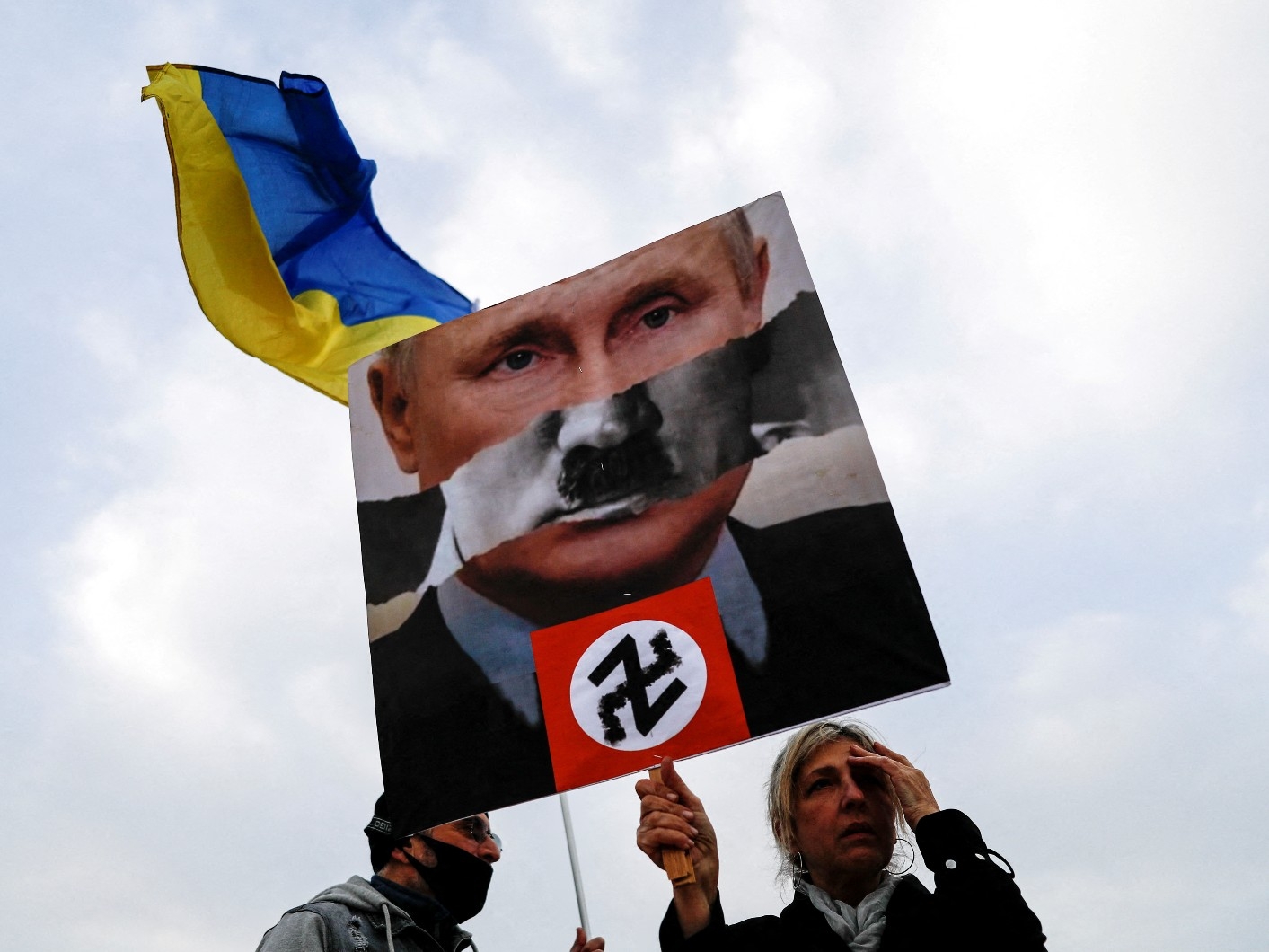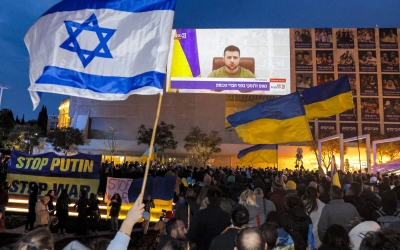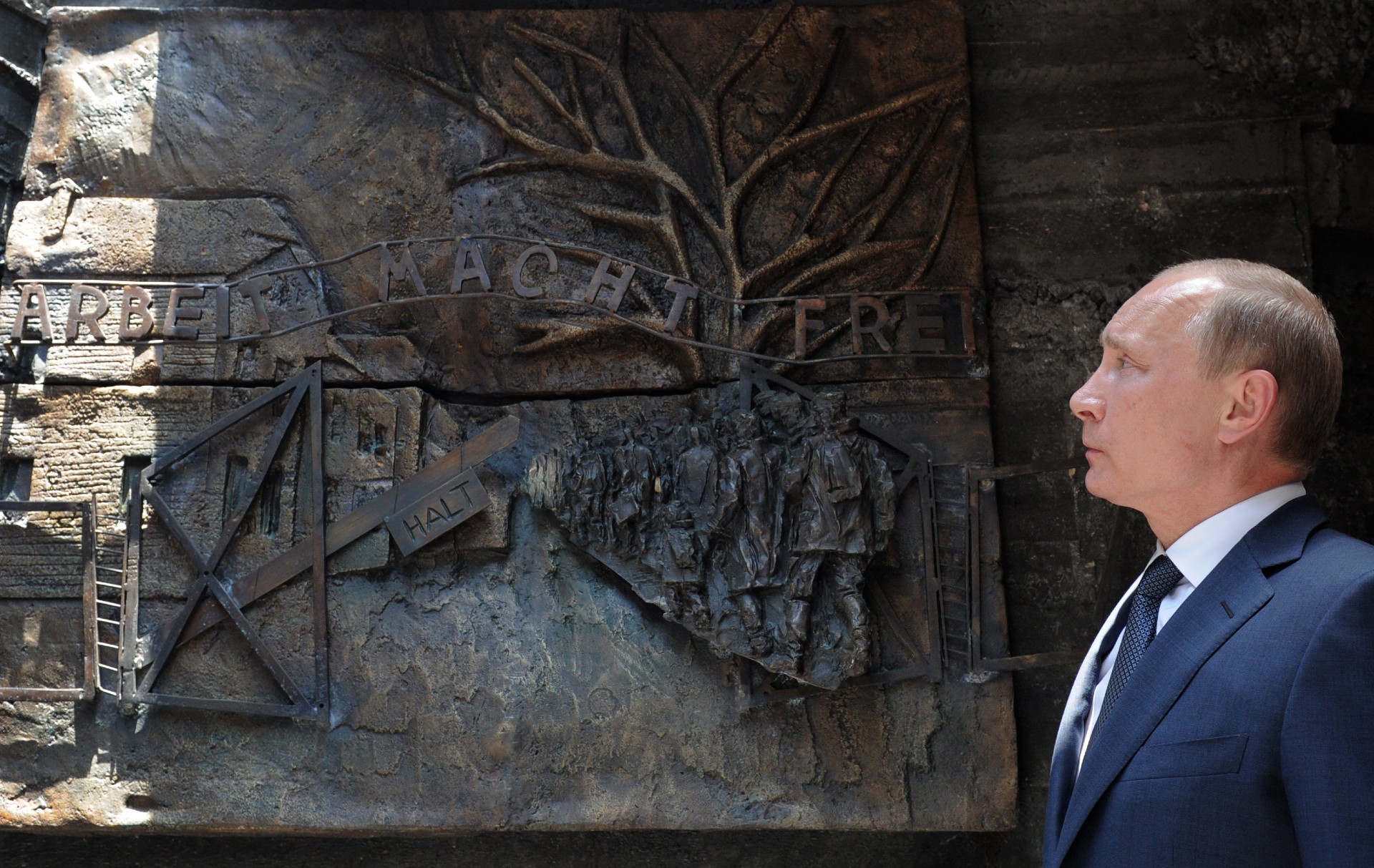Israel-Russia tensions: Celebrating victory over the Nazis is the next chapter

Vladimir Putin is not going to like it.
He has probably never heard of Sofia Beilin, deputy mayor of Ashkelon, or Ilana Taborisky, in charge of the absorption of new immigrants and now refugees from Ukraine and Russia in the central city of Rehovot.
Yet those far-from-famous women are now part of a drama triggered in Israel by the Russian invasion of Ukraine titled: “What does Israel do about 9 May, Russia’s Victory Day over Nazi Germany?"
Russia expects Israel to show solidarity with the date by observing the annual ceremonies marking the Red Army’s victory. But pressured by Ukraine to abstain, Israel unexpectedly finds itself in a looming political crisis over a date.
For several years now, Israel has been one of the few countries to celebrate the Nazis’ demise on 9 May, together with Russia and a few former Soviet states, rather than on 8 May, Victory in Europe (VE) Day.
Stay informed with MEE's newsletters
Sign up to get the latest alerts, insights and analysis, starting with Turkey Unpacked
Should this relatively new tradition be observed? It is not a matter of a one-day difference; it is a profoundly political decision.
Eugene Korniychuk, Ukraine's ambassador to Israel, recently met with Pnina Tamano-Shata, Israel's immigration and absorption minister, to discuss the issue.
Following the meeting, Korniychuk posted on Facebook that “despite the tradition of the previous years, facing the aggression against Ukraine, Israel will refrain from public events and marches on 9 May”.
The Ukrainian was quick to clarify. He said “false information” had been spread, claiming the annual parade had been cut short due to the great age of the veterans participating, adding that Victory Day will be marked in parliament to commemorate the 250,000 Jewish soldiers in the Red Army.
In other words, the Ukrainian ambassador misunderstood the situation, or decided to willfully misunderstand it.
Ashkelon deputy mayor Beilin, who belongs to Yisrael Beiteinu, a party that draws its support base from immigrants from ex-Soviet lands, was bullish in response.
She promised full celebrations in her port city on 9 May, promising to not let “anybody take over the victory of the Jewish heroes and rewrite history. I stick to our tradition.”
That’s not entirely true. Every year, Victory Day serves as an opportunity to invite ambassadors of former Soviet states and embellish the ceremony with cherished symbols, like the Ribbon of Saint George, the old Russian military honour given to veterans in Israel by the Russian consulate.
In 2022, however, the symbol currently being used by Putin’s army is a step too far, even for people such as Beilin. “It now carries bad connotations,” she admits. There will be no ambassadors, no ribbons this year. It is just too risky.
Forty kilometres away, in Rehovot, Taborisky is opting for an 8 May ceremony.
Aware of the messy situation, she told MEE: “It had nothing to do with external pressure, but rather to accommodate the veterans of war who have other obligations on the 9th.”
The only real opposition, she says, came from a local mother whose son has joined the Ukrainian army to fight the Russian invader.
Some organisers told MEE a group of refugees from Ukraine and immigrants who recently left Russia plan to join forces and lay together a wreath on a local monument in a quiet act of defiance. If they can find a way to work together, that is.
New traditions
Russia’s celebration of the Soviet Union's victory over the Nazis on the 9th rather than the 8th like their western wartime allies is significant. It is a statement. It is a huge event, the most important in Russian modern history.
Victory Day is a day of glory, of national pride, of overt display of raw military power and missiles, accompanied by a parade in Moscow, where Putin hosts his nearest and dearest. Benjamin Netanyahu had the honour in 2018.
Putin has used the defeat of Nazism as a political tool, a foundational myth for the ultranationalist Russia of the 21st century. Russia calls it the Great Patriotic War, not World War II.
Israel has become part of this story. Over the years, as Putin has pushed Victory Day’s significance, the tens of thousands of Jewish veterans now in Israel have also been honoured.
They - and their children and grandchildren - fought hard and long to regain some of the benefits they enjoyed in their country of origin, such as extra pensions. But mostly they sought and gained moral recognition in Israel, and veterans’ entry into the pantheon of Israeli heroes.
Before the waves of immigration from former Soviet states began in the 90s, the role of the Red Army in the victory was almost erased from history in Israel. Memory was distorted by politics after the Soviet Union cut off diplomatic relations with Israel following the 1967 war.
Back then, the only people in Israel to mark the Soviet victory were members of the local communist party. The party’s Jews and Palestinian citizens performed an annual ceremony in the small Red Army forest near Jerusalem. They will do so in 2022 as well.
Yet these communists were no partners for the predominantly right-wing post-Soviet immigrants, who insisted on implementing their own imported traditions in their new and reluctant country.
The communal festivities on 9 May were sometimes misunderstood and ridiculed. Nevertheless, the heroes of this non-Israeli war engaged in a long political and legal struggle. And they won.
In 2017, MPs passed a law that wrote 9 May into the national calendar, including an official parade, a special session in parliament, a budget allocated to all municipalities for local events, and more. Since then, Israeli politicians compete over who will do more on that day to please their local electorate.
Putin himself was extremely instrumental in the process of preserving his potentially politically and socially important diaspora in Israel.
The Russian president came to Jerusalem in 2020 to inaugurate the 8.5 metre-tall monument dedicated to the victims and defenders of the siege of Leningrad, and year after year he sends medals and decorations to the heroes he considers his.
Souring relations
Then came the invasion of Ukraine and 9 May, 2022.
What does Israel do now, when the victory Putin appropriated and Israel was happy to share is no longer of that glorious Red Army, but of the army that carried out the massacres in Bucha?
What does official Israel do? What do immigrants from the 15 post-Soviet republics do? Even the few Soviet-era Ukrainian flags raised at a tiny 1 May gathering in Tel-Aviv caused uproar. The timing and the nature of the Victory Day celebrations is potentially explosive material.
It is not just an Israeli question. Kazakhstan, until now one of the few countries alongside Israel to celebrate 9 May with Russia, decided not to hold the traditional Victory Day parade this year.
'For me, Victory Day belongs to my grandparents and not to Putin'
- David Aidelman, political commentator
The reaction was quick: in response, a prominent Russian presenter and ardent Putin supporter, Tigran Keosayan, posted a YouTube video literally threatening Kazakhstan, saying: “Look at Ukraine carefully, think seriously”.
The Kazakh foreign ministry responded by warning Keosayan he might banned from entering the country; Keosyan doubled down, saying relations between Russia and Kazakhstan would be damaged.
That cannot happen with Israel. Relations with Russia have already been too badly damaged by the war in Ukraine.
After months of careful policy to please both sides and antagonise no one, Israel’s government has failed miserably. Prime Minister Naftali Bennett’s short-lived role as a mediator between Russia and Ukraine has amounted to nothing.
Ukraine is openly angry and disappointed with Israeli policy. Russia is furious at perceived Israeli support for Kyiv, with Foreign Minister Sergei Lavrov stunning the world by claiming this week that “Hitler also had Jewish blood” and “most ardent antisemites are usually Jews”.
For most Israelis from the post-Soviet republics, it is mainly a personal issue.
“For me, Victory Day belongs to my grandparents and not to Putin,” political commentator David Aidelman told MEE.
“Putin does not own it, and I am not willing to hand it over to him as a gift. This is exactly what he wants.”
Middle East Eye delivers independent and unrivalled coverage and analysis of the Middle East, North Africa and beyond. To learn more about republishing this content and the associated fees, please fill out this form. More about MEE can be found here.






